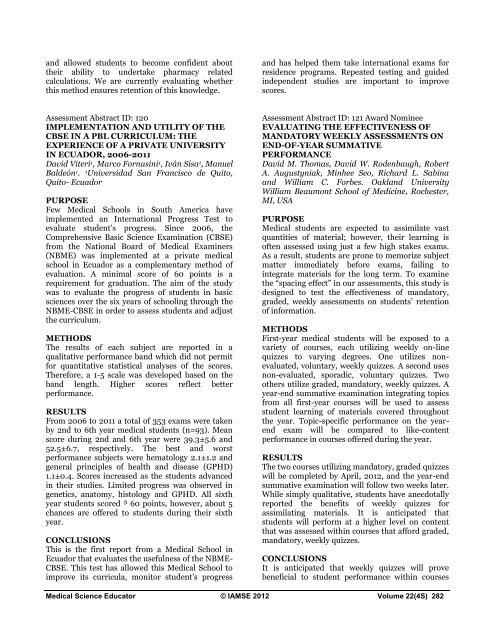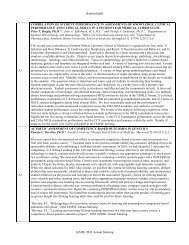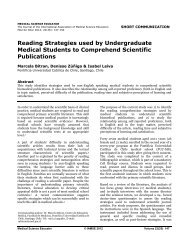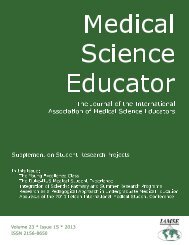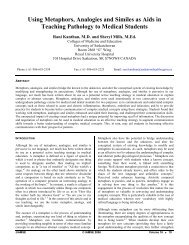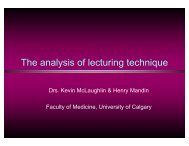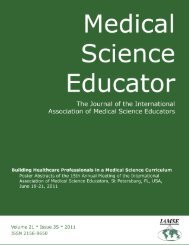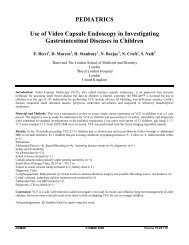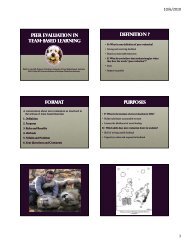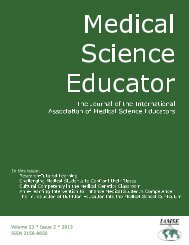Click here to view complete journal in pdf-format - IAMSE
Click here to view complete journal in pdf-format - IAMSE
Click here to view complete journal in pdf-format - IAMSE
You also want an ePaper? Increase the reach of your titles
YUMPU automatically turns print PDFs into web optimized ePapers that Google loves.
and allowed students <strong>to</strong> become confident about<br />
their ability <strong>to</strong> undertake pharmacy related<br />
calculations. We are currently evaluat<strong>in</strong>g whether<br />
this method ensures retention of this knowledge.<br />
and has helped them take <strong>in</strong>ternational exams for<br />
residence programs. Repeated test<strong>in</strong>g and guided<br />
<strong>in</strong>dependent studies are important <strong>to</strong> improve<br />
scores.<br />
Assessment Abstract ID: 120<br />
IMPLEMENTATION AND UTILITY OF THE<br />
CBSE IN A PBL CURRICULUM: THE<br />
EXPERIENCE OF A PRIVATE UNIVERSITY<br />
IN ECUADOR, 2006-2011<br />
David Viteri 1 , Marco Fornas<strong>in</strong>i 1 , Iván Sisa 1 , Manuel<br />
Baldeón 1 . 1 Universidad San Francisco de Qui<strong>to</strong>,<br />
Qui<strong>to</strong>- Ecuador<br />
PURPOSE<br />
Few Medical Schools <strong>in</strong> South America have<br />
implemented an International Progress Test <strong>to</strong><br />
evaluate student’s progress. S<strong>in</strong>ce 2006, the<br />
Comprehensive Basic Science Exam<strong>in</strong>ation (CBSE)<br />
from the National Board of Medical Exam<strong>in</strong>ers<br />
(NBME) was implemented at a private medical<br />
school <strong>in</strong> Ecuador as a complementary method of<br />
evaluation. A m<strong>in</strong>imal score of 60 po<strong>in</strong>ts is a<br />
requirement for graduation. The aim of the study<br />
was <strong>to</strong> evaluate the progress of students <strong>in</strong> basic<br />
sciences over the six years of school<strong>in</strong>g through the<br />
NBME-CBSE <strong>in</strong> order <strong>to</strong> assess students and adjust<br />
the curriculum.<br />
METHODS<br />
The results of each subject are reported <strong>in</strong> a<br />
qualitative performance band which did not permit<br />
for quantitative statistical analyses of the scores.<br />
T<strong>here</strong>fore, a 1-5 scale was developed based on the<br />
band length. Higher scores reflect better<br />
performance.<br />
RESULTS<br />
From 2006 <strong>to</strong> 2011 a <strong>to</strong>tal of 353 exams were taken<br />
by 2nd <strong>to</strong> 6th year medical students (n=93). Mean<br />
score dur<strong>in</strong>g 2nd and 6th year were 39.3±5.6 and<br />
52.5±6.7, respectively. The best and worst<br />
performance subjects were hema<strong>to</strong>logy 2.1±1.2 and<br />
general pr<strong>in</strong>ciples of health and disease (GPHD)<br />
1.1±0.4. Scores <strong>in</strong>creased as the students advanced<br />
<strong>in</strong> their studies. Limited progress was observed <strong>in</strong><br />
genetics, ana<strong>to</strong>my, his<strong>to</strong>logy and GPHD. All sixth<br />
year students scored ³ 60 po<strong>in</strong>ts, however, about 5<br />
chances are offered <strong>to</strong> students dur<strong>in</strong>g their sixth<br />
year.<br />
CONCLUSIONS<br />
This is the first report from a Medical School <strong>in</strong><br />
Ecuador that evaluates the usefulness of the NBME-<br />
CBSE. This test has allowed this Medical School <strong>to</strong><br />
improve its curricula, moni<strong>to</strong>r student’s progress<br />
Assessment Abstract ID: 121 Award Nom<strong>in</strong>ee<br />
EVALUATING THE EFFECTIVENESS OF<br />
MANDATORY WEEKLY ASSESSMENTS ON<br />
END-OF-YEAR SUMMATIVE<br />
PERFORMANCE<br />
David M. Thomas, David W. Rodenbaugh, Robert<br />
A. Augustyniak, M<strong>in</strong>hee Seo, Richard L. Sab<strong>in</strong>a<br />
and William C. Forbes. Oakland University<br />
William Beaumont School of Medic<strong>in</strong>e, Rochester,<br />
MI, USA<br />
PURPOSE<br />
Medical students are expected <strong>to</strong> assimilate vast<br />
quantities of material; however, their learn<strong>in</strong>g is<br />
often assessed us<strong>in</strong>g just a few high stakes exams.<br />
As a result, students are prone <strong>to</strong> memorize subject<br />
matter immediately before exams, fail<strong>in</strong>g <strong>to</strong><br />
<strong>in</strong>tegrate materials for the long term. To exam<strong>in</strong>e<br />
the “spac<strong>in</strong>g effect” <strong>in</strong> our assessments, this study is<br />
designed <strong>to</strong> test the effectiveness of manda<strong>to</strong>ry,<br />
graded, weekly assessments on students’ retention<br />
of <strong>in</strong><strong>format</strong>ion.<br />
METHODS<br />
First-year medical students will be exposed <strong>to</strong> a<br />
variety of courses, each utiliz<strong>in</strong>g weekly on-l<strong>in</strong>e<br />
quizzes <strong>to</strong> vary<strong>in</strong>g degrees. One utilizes nonevaluated,<br />
voluntary, weekly quizzes. A second uses<br />
non-evaluated, sporadic, voluntary quizzes. Two<br />
others utilize graded, manda<strong>to</strong>ry, weekly quizzes. A<br />
year-end summative exam<strong>in</strong>ation <strong>in</strong>tegrat<strong>in</strong>g <strong>to</strong>pics<br />
from all first-year courses will be used <strong>to</strong> assess<br />
student learn<strong>in</strong>g of materials covered throughout<br />
the year. Topic-specific performance on the yearend<br />
exam will be compared <strong>to</strong> like-content<br />
performance <strong>in</strong> courses offered dur<strong>in</strong>g the year.<br />
RESULTS<br />
The two courses utiliz<strong>in</strong>g manda<strong>to</strong>ry, graded quizzes<br />
will be <strong>complete</strong>d by April, 2012, and the year-end<br />
summative exam<strong>in</strong>ation will follow two weeks later.<br />
While simply qualitative, students have anecdotally<br />
reported the benefits of weekly quizzes for<br />
assimilat<strong>in</strong>g materials. It is anticipated that<br />
students will perform at a higher level on content<br />
that was assessed with<strong>in</strong> courses that afford graded,<br />
manda<strong>to</strong>ry, weekly quizzes.<br />
CONCLUSIONS<br />
It is anticipated that weekly quizzes will prove<br />
beneficial <strong>to</strong> student performance with<strong>in</strong> courses<br />
Medical Science Educa<strong>to</strong>r © <strong>IAMSE</strong> 2012 Volume 22(4S) 282


